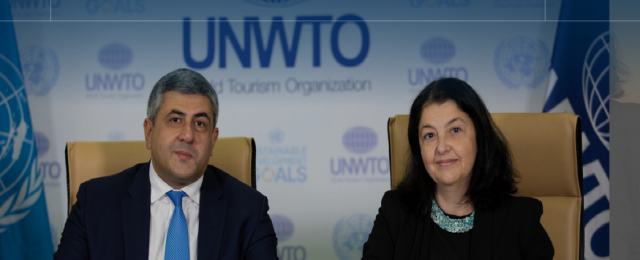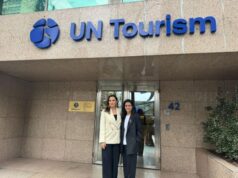Consistent and harmonized travel protocols, enhanced safety measures and the protection of jobs and livelihoods are the main ingredients needed for the restart of tourism. The Sixth meeting of the UNWTO Global Tourism Crisis Committee reminded participants of the need to work together as the only means of advancing the sustainable recovery of the sector. The meeting produced a commitment to create a new UNWTO Committee on Common Safety Protocols to increase confidence in international travel, as well as firm plans for enhanced consumer protection for consumers and measures to protect jobs.
Setting the tone for the meeting, UNWTO Secretary-General Zurab Pololikashvili made clear that, with many millions of livelihoods at stake, inaction is not an option, and that the rapid and sustainable recovery of tourism is essential.
“Strong coordination is needed to accelerate the lifting of travel restrictions in a safe and timely manner, to increase investment in systems that support safe travel, including testing on departure, and to sustain and support businesses and jobs. If we fail to address these three priorities, we will fail to restart tourism, and so fail to save millions of livelihoods”, Mr. Pololikashvili said.
This call for coordination was echoed by a diverse range of voices from the top level of politics of all global regions, including interventions from the Minister of Industry, Commerce and Tourism of Spain, Reyes Maroto; Ahmed bin Aqil Al Khateeb, Minister of Tourism of the Kingdom of Saudi Arabia; Khaled El-Enany, Minister of Tourism and Antiquities of Egypt; Dato’ Sri Hajah Nancy Shukri, Minister of Tourism, Arts and Culture of Malaysia; Abdulla Mausoom, Minister of Tourism of the Maldives; Rita Marques, Secretary of State for Tourism for Portugal and Jose Luis Uriarte, Sub-Secretary of Tourism of Chile.
Common safety protocols
At a practical level, a proposal for a new set of common travel protocols was put forward by Harry Theoharis, Minister of Tourism of Greece, and welcomed by UNWTO’s leadership and other members of the Committee. Furthermore, illustrating how safe, international travel can return, Marco Troncone, CEO of Rome Fiumicino Airport highlighted the role robust hygiene protocols and innovation can play in boosting consumer confidence.
Along the same lines, ICC Secretary-General John Denton, explained plans for a comprehensive system of testing on departure to raise consumer confidence and take away the need for quarantine on arrival. Alongside them, Adam Goldstein, Global Chairman of CLIA, and a Luis Felipe Oliveira, Director General of Airports Council International made clear the proactive measures undertaken to cruise tourism and air travel safe for both passengers and workers.
Putting people first
Just as people are at the driving force of global tourism, so too has UNWTO stressed that recovery policies must recovery be people-focused. For starters, restoring consumer trust and coherent and standardized international protocols are mutually reinforcing and critical for the return of tourism. The Crisis Committee meeting saw UNWTO announce plans for a new International Code for the Protection of Tourists. This will be the first legal framework to protect tourists’ rights as consumers, harmonizing minimum standards across different countries and ensuring the fair distribution of responsibility to tourists affecting by the pandemic among stakeholders across the sector.
A technical committee for the creation of the Code is being set up and will meet before the end of the month. Alongside this, UNWTO is working to protect jobs and help workers affected by the pandemic find new opportunities. Addressing the Committee Kamal Ahluwaila of tech company Eightfold.ai outlined the new Jobs Factory portal, launched with UNTWO in order to unite jobseekers with employers.
Harmonized travel criteria
Reflecting UNWTOs high-level relations with European institutions, the European Commissioner for Justice Didier Reynders addressed the Committee to outline plans to introduce common criteria for restrictions on travel across the EU. UNWTO advocated for non-EU Members to be considered part of this movement towards standardisation, particularly the common colour-coded mapping system currently being rolled out for the safe relaunch of free moment. And reflecting UNWTO’s status as part of the wider UN response to COVID-19, ICAO Secretary-General Fang Liu, was joined by representatives from IATA, ILO, IMO the WHO and for the virtual meeting, in addition to representation from the OECD.
About the UNWTO Global Crisis Committee
Leveraging its unrivalled status as the global leader of tourism, UNWTO united leaders from across the sector. From its first meeting, the UNWTO Global Crisis Committee has provided a platform for governments, businesses and international bodies to express their concerns and share ideas for the restart of tourism. The Committee’s composition reflects not only UNWTO’s unique influence and status as a part of the United Nations but also tourism’s importance for every global region and the sector’s cross-cutting nature. Members are drawn from all parts of the world and include government Ministers, leaders and key representatives of International Organizations and UN agencies and from tourism’s private sector.












